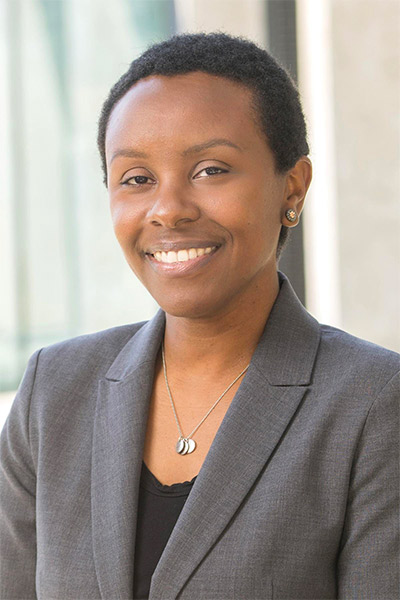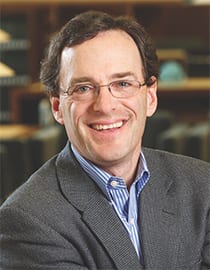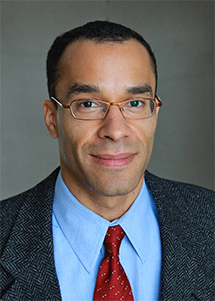By Gwyneth K. Shaw
When Professor Abbye Atkinson decided to make the leap into legal academia, she was drawn to the fundamental issues of inequality, race, and gender for her scholarship. Early on, she says, some told her to stay away from the topics, or risk being pigeonholed.
Atkinson persisted, focusing on how debt — especially high-cost borrowing, such as payday loans — can further marginalize and impoverish already poor people and communities. In her research, which has been published in top journals, including the Stanford Law Review and Columbia Law Review, she links how debtor and credit laws and policies pose additional hurdles to low-income communities, often drawing wealth out of these areas.

In the process, she’s become a treasured teacher and a widely-respected scholar, even testifying before the U.S. Senate Banking Committee last year about credit, debt, and the widening racial and gender gap.
And now, she’s the first recipient of the American Constitution Society’s Ruth Bader Ginsburg Scholar Award.
The Class of 1965 Assistant Professor of Law, Atkinson says she’s thrilled to get the award, which recognizes “an outstanding scholar in the early stages of their academic career who has demonstrated those qualities exemplified by Justice Ginsburg: scholarly excellence, the ability to imagine how society might be more just and more equal, and the determination to use the law and one’s scholarship to creatively and strategically make the imagined real,” according to the ACS.
“Certainly, being associated with anything that’s inspired by Justice Ginsburg is a huge privilege,” she says.
It also feels validating, she adds, to be linked to someone who fought for a more just world until the very end of her life.
“In the earlier parts of her career, she was really battling against those who probably told her, ‘Don’t go to law school, don’t be a judge, don’t write about gender’ — lots of don’ts,” Atkinson says. “And she was pushing forward with what was meaningful and important to her.”
Dean Erwin Chemerinsky calls her work “truly pathbreaking in looking at the effect of the law, and particularly consumer law, on those who are economically struggling.”
Pushing boundaries
Atkinson, who earned her undergraduate degree at UC Berkeley and her J.D. from Harvard, was a lecturer at Stanford and a fellow at Harvard before joining the Berkeley Law faculty in 2017. She says she finds academic research challenging — “I’m not an easy writer” — but tremendously rewarding. That makes this award even sweeter.
“It’s a privilege to have a job that requires me to read stuff I’m interested in and write about it and teach some very smart people. But I don’t think I would do it just for those reasons,” she says. “What led me to where I am and what helps keep me going is the idea that there are things in the world that are just inherently wrong, and maybe in some small way I can contribute to righting those things.
“I love that I’ve done what was in contradiction to that advice, that I’ve focused on what is meaningful to me, and that’s it’s working.”

Ted Mermin ’96, one of a large group of faculty and current and former students who nominated Atkinson, says it’s impossible to read the award’s criteria and not think of her. As executive director of the Berkeley Center for Consumer Law and Economic Justice, Mermin has worked closely with Atkinson, including co-teaching the Consumer Law and Economic Justice Workshop this spring.
“Abbye’s work criticizing the use of credit as part of the social safety net is already nationally known and cited by not only by legal scholars but also academics in other disciplines,” Mermin says. “She is still pre-tenure, yet she already serves as a guiding light for her colleagues around the country and, as I can personally attest, inside the law school.
“I am confident that Justice Ginsburg would be delighted by the choice of Abbye as the inaugural recipient of the award.”
The nomination sent to the ACS, signed by more than 50 students and alumni and a number of current and former law school colleagues, calls Atkinson “a brilliant and empathetic scholar who recognizes the importance of centering legal scholarship on the lived experiences of communities that have historically been excluded, subordinated, or forgotten by the legal system. We have no doubt that throughout her academic career, Professor Atkinson will continue to be a leading voice in our society on behalf of the marginalized, communities of color, people in poverty, and children. Like Professor and, later, Justice Ginsburg, Professor Atkinson is someone who makes an impact on everyone around her and works towards transforming our society so that future generations can live in a freer and more just world.”
Francesco Arreaga ’21, now working as a policy advisor in the U.S. House of Representatives, says Atkinson embodies the spirit of Ginsburg and the award. He has fond memories of visiting in her office to talk about her Contracts course and research.
“As someone who aspired as a law student to do legislative work, it was inspiring to see Professor Atkinson utilizing her legal scholarship to encourage policy changes that create a more just and equitable society,” Arreaga says.
Shining a spotlight
One example, he added, is an essay Atkinson published in the New York University Law Review’s online symposium issue on “Race and Reckoning.” It’s a reflection on Philando Castile — a school cafeteria supervisor known for frequently using his own money to pay off students’ lunch debts — and how he stepped in to provide a safety net for children before his own life was taken by the state.
“Philando Castile was a philanthropist, working to keep children safe in a space where the state declined to take up that burden. He undertook this burden even up until the moment the state failed to keep him safe,” Atkinson writes. “Consequently, just as Mr. Castile’s death is deeply lamentable, so is this system that continues to privatize social welfare in this perverse way.”

“That article is emblematic of how Professor Atkinson uses her legal scholarship to shine a spotlight on communities that are often excluded or targeted by the legal system,” Arreaga says. “This is one of the many examples in which her scholarship focuses on the lived experiences of people while also advocating for a more just system.”
Atkinson will receive the award, which comes with a $5,000 stipend, at the ACS National Convention in June. When Mermin and Professor Jonathan Glater (who also works closely with Atkinson) shared the news with the law school faculty in March, it sparked an outpouring of congratulatory emails. That was its own gratifying experience, Atkinson says.
“It was nice to get this moment of feeling that maybe there are people out there who see value in the things that I’m attempting to do,” she says. “And I was also just thrilled by the idea that students and my colleagues were really responsible for this.
“More than anything else, the internal, institutional — really kind of familial love — that it represented for me was really important and wonderful.”